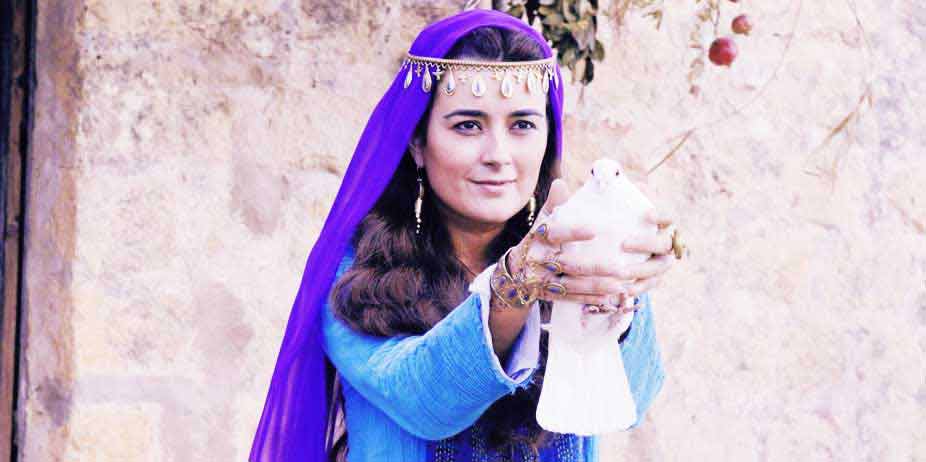 The
Dovekeepers (2015)
The
Dovekeepers (2015)
I'm a little baffled that the producers are promoting this miniseries to the "church crowd," considering its heroines are witchcraft-using adulterers, and its shockingly modern immoral sensibilities feel distinctly out of place in a swords and sandals movie about ancient Jewish civilization. It's not really a Christian movie, or even a decent movie about the Jewish culture of the period. It's a steamy romance novel set against a historical event.
After the fall of Jerusalem, the historian Josephus (Sam Neil) asks of two women the history of what happened in Masada, and hears their life stories. The daughter of a prostitute, Shirah (Cote de Pablo) is well-versed in mysticism and the ancient ways, and has a reputation as "the witch of Moab." Her out of wedlock pregnancy forced the elders in Jerusalem to expel her from the city, in part because the child was born of an adulterous tryst; she fled into the desert, where she raised her daughter Aziza (Kathryn Prescott) as a boy. One marriage and abandoned husband later, she and her children fled to Masada to be with her lover. It is high time for Aziza to become a woman, and she soon catches the eye of a dashing young Jewish man...
Yael (Rachel Brosnahan ) has a curious connection to symbols and her dreams frequently entwine with a lion in the desert; she comes to know him in the form of a man who crosses her path and impregnates her in a passionate but short-lived tryst, shaming her before the eyes of her family and enraging his wife. Circumstances end in the death of her lover and his wife; months later, Yael is haunted by the woman's ghost as she struggles to find her life anew in Masada as one of several women who tend the city's doves. But as she and the other women strive to find happiness in the arms of new men, the Roman legionaries close in on Masada, as the last stronghold of Judea, in their bitter desire to eradicate the Jewish nation for good.
Though early previews hinted that this series would be heavier on the smut than I like, I still hoped there might be a redeemable plot line in there somewhere. Unfortunately, I was let down ... by unlikable female characters whose primary purpose seems to be to bed various handsome men and produce their illegitimate offspring, despite all of them claiming to live the Jewish faith. Put simply, premarital sex in the ancient Jewish culture was not common and greatly despised; that all of them so freely engage in it, including adultery, is imposing modern immorality on ancient cultures. Though all of them call upon the name of God now and again and profess the Jewish faith, none of their actions prove it -- in fact, Yael and Shirah both routinely indulge in witchcraft.
It is really nothing more than a
series of amoral love affairs unfolding against a history that is
not well explained; if you know nothing of the period, the
fall of Jerusalem, or the events of Masada, you will be
lost. The series also assumes familiarity with Josephus and
tends to jump around in its narrative; years pass without
the heroines aging at all. It was hard for me to root for or
even like most of the characters, and I was soon bored
enough that I started multi-tasking in my viewing. The
production itself is good. It has decent special effects and
an excellent cast. Had I emotionally invested in these
characters and their sordid love affairs, I would have found
it emotionally moving toward the end. It's clear that much
time, money, and effort went into a project that
ultimately... had too much sex, adultery, paganism, and
selfish characters to inpress me.
Sexual Content:
The main characters all either engage in adultery or
premarital sex (four graphic, rather long sex scenes;
other scenes include partial nudity and passionate kissing).
We see most of a woman's bare back and side while she is
embracing her lover in the cistern; she makes a reference to
being raped, and her child being raped as well, by Roman
soldiers (we see a brief flashback of them holding her
down). A young man tries to rape a girl he professes he is
in love with; she fights him off.
Language:
None.
Violence:
Scenes of Romans and Jews killing one another, mostly
bloodless but with lots of stabbing, head-beating, etc.
Other:
A fair amount of mysticism and pagan rituals, as well as
ghostly apparitions. Witches use potions on people.
Superstition includes "taking" and "sharing" human souls,
mentions of demons, etc.
